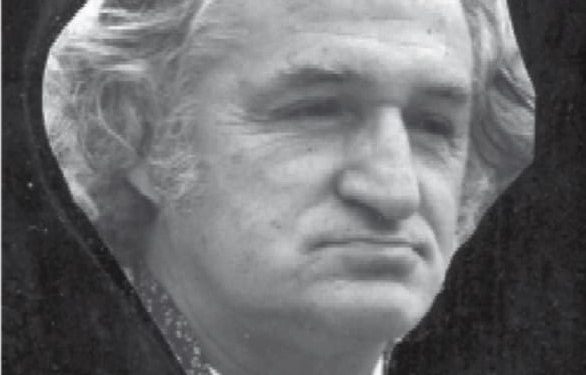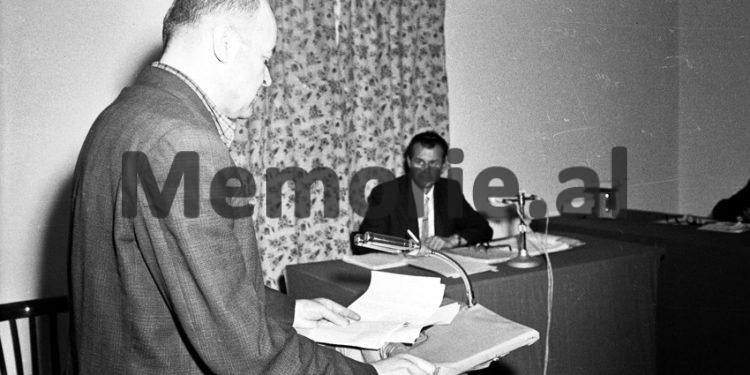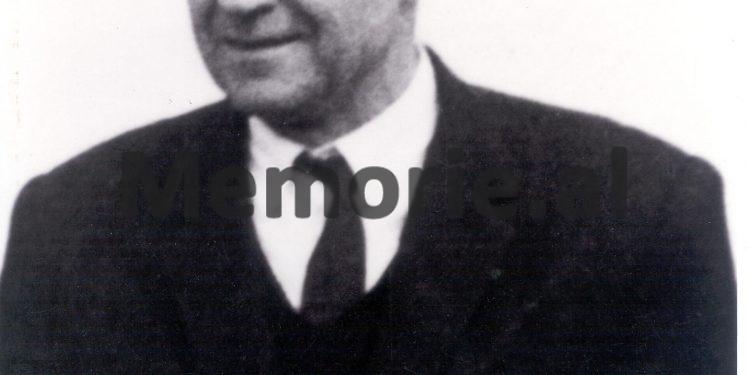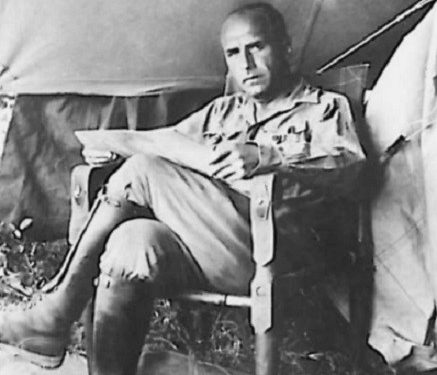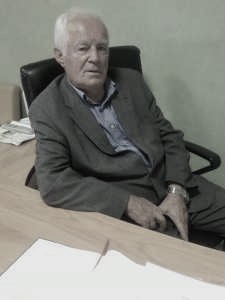By Ing. Oil, Bujar Leskaj
-Bequest of oil engineer and geologist, Nuredin Skrapari-
Memorie.al / Today marks 1 year since the death of the engineer and geologist, prominent personality of the Albanian oil intelligence, Mr. Nuredin Skrapari. His impressive contribution to the search and discovery of new oil sources was tragically connected with his human drama, arrested and politically punished by the communist regime in 1974. Nuredin Skrapari was born in the village of Bubullimë in the district of Lushnje, in May 1944 and completed secondary school (“Technicum of Petroleum”), in the branch “Geology”. In the years 1962 – ’64, he was employed in the General Directorate of Oil in Kuçovo, with survey groups for the discovery of oil and gas sources.
In 1969, he finished his studies at the University of Tirana, at the Faculty of Geology-Mining, with excellent results, graduating as “Geological Engineer”, to work immediately after graduation at the Oil and Gas Research Institute in Kuçovo and then in Fier, with the geological survey groups, until March 15, 1974, the day he was arrested. Nuredin Skrapari is the co-author of the preparation of geological maps and the design of deep oil wells in Skrapar, Finiq (Saranda), Delvinë, Cakran (Fier), etc.
The communist regime put an end to his voluminous and quality work for the benefit of discovering new oil sources, arresting and convicting him, on May 10, 1974, in the trial held in Kuçovo, with 10 years of imprisonment for agitation. and propaganda and breaking the portrait of the dictator. Nuredini served his sentence in Spaçi prison. On February 22, 1979, he was arrested for the third time and re-sentenced to 18 years in prison, with the motivation of “Participation in a counter-revolutionary and revisionist organization, for the overthrow of popular power.”
In May 1984, Nuredini was transferred to the prison of Qafë-Bar, where he played an important role in the well-known revolt of the political prisoners of this prison. The revolt was suppressed with terror and the convict Nuredin Skrapari was brutally tortured and after the hospital-prison, he was sent to serve his sentence in the prison of Burrel. With this tribute, bowing with respect to his memory and contribution, I have the honor to give some considerations for his scholarly work: “The Tragedy of Oil Intelligence”.
Many may have read about “hostile groups sabotaging the economy” during the communist dictatorship in Albania. But Nuredin Skrapar’s book, entitled “The Tragedy of Oil Intelligence”, shines in terms of its truthfulness, the many facts, the naked exposure of the communist regime, the deep humanity and the manly and patriotic attitude of the majority of the cream of Albanian scientists and specialists, who made possible the discovery of new oil sources in Albania.
It was their contribution that drilling wells and oil production took an upward trajectory, in the years 1968-1972, to reach the record figure of 2.5 million tons of oil. produced in 1976. Based on international stock exchange prices at the time, this amount of oil. was equal to the value of a quarter of a billion dollars. But the dictatorship did not recognize the technical condition of ineffective drilling. in the multitude of open wells.
While in the USA, around 50,000 open barren wells were accepted per year, for several dozen such open wells in Albania, the dictatorship raised accusations of sabotage and the work of foreign agencies. Then, the employees of the State Security devised spies, agents and saboteurs with extraordinary zeal, among the most hardworking and patriotic people that the history of Albania has known, in the years 1945-1990.
The publication “Tragedy of oil intelligence”, a book divided into small parts with interesting subtitles, as engineers know how to write, describes with chilling truth events and facts about the tragedy of oil intelligence, from 1946 to 1991. The author of the book was no more than 32 years old when he was publicly arrested on the absurd charge of being a saboteur. Scientist Koço Plaku, accused as the leader of the group, in one of the hearings, addresses the investigator: “And these two, Nuredin Skrapar and Kadri Rama, why did you arrest them?! They are smart guys and skilled specialists in the fields of oil discovery and exploration. Get these people out of jail…”!
This implies how much this young geologist specialist and his fellow Vlonjat promised and what havoc the communist dictatorship was wreaking with its nonsense in the ranks of the tried and experienced intelligentsia of the Albanian oil and the new one that was being born. The tragedy of the so-called saboteurs or hostile groups, which really constituted a genocide against the oil intelligentsia, begins with the conviction of the scholar, the eminent Polish geologist Stanislav Zuber in 1947.
The Polish professor, Zuber, left as a legacy a geological and tectonic map of Albania, worked out in detail, which is still used today by our geologists. With the wells he designed in Kučovo in 1928 and in Patos, in 1942, he managed to extract industrial oil in the sandy areas. With the coming into power of the communist regime, he will be arrested as an agent of the Italians and will be left to die in prison by the kicks of the guard, in the most animalistic way.
However, with his many maps and studies, the work in geology continued, discovering mineral and hydrocarbon sources, and even sources of drinking water. At this time (year 1947), the first group of oil intelligence is punished, with personalities such as; Professor Zuber and the engineers Riza Alizoti, Thoma Pojani, etc. (in addition, for Prof. Zuber, Nuredin Skrapari and the author of this tribute, we recommend reading the book by Prof. Arqile Teta, dedicated to the life and activity of the outstanding Polish professor).
After the departure of the Russian specialists, in 1961, Albanian geologists managed to discover three new sources in Visokë; Patos in 1963, Ballsh in 1964, Gorisht in 1967. According to Nuredin Skrapar, the author of these discoveries of exceptional value for the Albanian economy was Koço Plaku, supported by his colleagues; Milto Gjikopulli, Beqir Aliaj, Protoko Murati, Dhimitër Stefa, Jani Konomi, Academician Teki Biçoku, Kadri Rama, Nuredin Skrapari, Thanas Nasto, Niko Goxhobashi, etc. (see pages 77-78 in the book), all arrested and sentenced as saboteurs, after 1974.
After the break with the Chinese, the Albanian economy eventually began to go downhill. The dogmatic government brought forth the destructive theory of self-reliance, without outside help. Following Albania’s bunkerism, the oil production that began to be called “black gold” became vital for the Albanian economy. Oil prospectors and employees of the Oil Research Institute were faced with an unusual pressure: At all costs to discover new sources! The Political Bureau of the ALP Central Committee issued a special decision regarding its reserves. But oil could not be extracted by party decisions.
In 1970, oil production was reaching about 2 million tons. Enver Hoxha shouted at the meeting of the Political Bureau: “We want oil”! Regarding this, the engineer Nuredin Skrapari says: “Dictator Enver Hoxha, there from the beginning of March 1975, received in a meeting of 10 minutes, the main oil executives, Lipe Nashin, General Director of Nafta, the geologist Beqir Alia, in the position of To the Director of the Petroleum Institute, geologists Protoko Murati, Milto Gjikopulli (head of the sector), geologist Koço Plaku, as head of the cabinet of generalizations, of deep well design – (p. 32 in the book, the last fragment)”…Enver Hoxha he was distrustful of us, and Lipja understood this, when he muttered two shocking words through his teeth, as Lipja had explained to him: “O plan, o djanin”!
At that time, the Political Bureau made the infamous statement that: “Albania runs on oil, but we don’t have specialists to detect it”. The economy needed oil and the breakdown of relations with China made the problem worse. Then, Enver Hoxha re-invented the existence of hostile groups in oil and, as happened in 1947, “discovered” the second hostile group in oil. In his book, Nuredin Skrapari writes: “On March 15, 1974, I, Nuredin Skrapari, was publicly arrested.
My life was completely turned upside down. On March 25, 1975, Lipe Nashi, Beqir Alia, Protoko Murati, Milto Gjikopulli, Koço Plaku were arrested. Four months ago, on November 29, 1974, Lipe Nashi and Koço Plaku received the title: ‘Hero of Socialist Work’. This hunt continued with the arrest of dozens of other specialists, among the best and most skilled, in oil extraction. The number exceeded 80 people”.
The absurdity of the trial reached its peak, when the Prosecutor and the President of the trial body, would declare: “The oil sources were not discovered by you enemies and saboteurs, but by the party and Comrade Enver”. All this resembled a medieval inquisition trial, with real Prosecutors Haki Toska and real President of the court, Adil Çarcanin.
A long ordeal of suffering began, for all those hero-scientists, who were the pride of the Albanian intelligentsia, with the work done in the discovery of new places-resources, until that time. The charges were serious; “agents of foreign services, who deliberately sabotaged the Albanian economy, in order to fail the construction of the socialist society in Albania”. Simply, without excessive words, quietly, without hatred, the prominent geologist Nuredin Skrapari, shows the tortures in the investigator, to admit that they were a structured group, in the service of foreign agencies.
The author of the book says that, being the youngest, great pressure was exerted on him to break him, to accept the charges and cooperate with the State Security. He says: “We were asked to accept the charge as saboteurs. I was 10 years younger than my bosses. They made me an offer: You are young. Think about the family. You will not do more than four years, if you cooperate with us”.
Nuredin Skrapari refused to become a collaborator. Noble in spirit and indomitable in character, he accepted a black life with a white face rather than sink his colleagues. Tired of constant torture in the interrogator, he will state in the book: “Finally, I signed my re-conviction. Desolate how expensive life was even in the mouse hole where I had ended up, it seemed painful to me! I was only 32 years old” (see pages 32-34 in the book).
This cost him 16 and a half years in prison, with forced labor in the mines of Spaç and Qafë-Bar. About his leader and guide in the contribution to Albanian oil, the well-known scientist, Koço Plaku, with admiration for his manly attitude in the investigation and in the court, Nuredin Skrapari writes in the book: “Koço Plaku, when they asked the investigator to admit that was a KGB agent, he said: Now it’s my turn. Then he continued in a low voice: I would like the homeland to love us, as we loved it!
The destruction with the oil intellectuals is stigmatized by Nuredin Skrapari himself, when he says: “They opened a river with oil, Enver Hoxha opened a stream with their blood” (ibid., see pages 32-34 in the book). Furthermore, the author of the book continues: “Koço Plaku was intercepted by the investigator. At the end of his monologue, it was recorded: Enver Hoxha filled Albania with graves…”! Hostile groups in oil and other areas of the economy would continue. Ironically, in 1977, ministers Abdyl Këllezi, Koço Theodhosi, Kiço Ngjela and Vasil Kati were arrested as saboteurs and sentenced to death and long imprisonment.
The dictatorship machine continued to eat its own sons. In 1986, the third hostile group was arrested, which included; Petraq Xhaçka, Enriko Veizi, Mynyr Arapi, Petrit Sadushi and Luan Kelliçi, all with scientific degrees. It was sad to think that any of these had served as a witness against their friends in the trial of 1974. Fisnik forgives. Nuredin Skrapari telegraphically mentions and forgives the oil specialists, those who testified against him and the generation of intellectuals of the 70s.
His language in the book, as well as in the white life he led, never had tones of hatred and revenge. As a true intellectual, who loves and cares for the Motherland, the book of Mr. Skrapari “The Tragedy of Oil Intelligence” ends with his concern and conviction that there is oil in Albania and this can be discovered. In the book, he states that oil production continued to decline rapidly.
The author of the book writes: “In 1991, oil production fell to 900,000 tons, while in 1976, it was the year of the highest production, with 2.5 million tons of oil.” His order, as a bequest left by those who are no longer here and for those who will come, is: “In Albania, there are still undiscovered oil resources, waiting for the mind, skill and intuition of qualified geologists Albanians, to be discovered. I appeal to the governments. for the establishment of the Research Institute of Oil, Minerals, etc.”.
This is how geological engineer Nuredin Skrapari concludes his 120-page book: “The Tragedy of Oil Intelligence”, published by “Migeeralb” Publishing House, in 2016, which we as the High State Control promoted for about a year and a half ago, together with the author and his brother of suffering and profession, Mr. Kadri Rama. It is a thesis that fully coincides with the recommendations that as KLSH, since 2014, we have addressed to the Albanian government, for the re-establishment of the Petroleum Research Institute, as a necessity for finding new sources, but also a better management of existing resources.
With a special force of the pen, the author says: “This is how dictator Hoxha ‘rewarded’ the brain of the oil intelligence. Enver Hoxha’s bloody sword has taken the lives of many geologists. The monster took the lives of productive intellectuals, who I can say have entered the hierarchy of contribution of values and results, who, together with oilmen and miners, shouldered the survival of Albanians in that ominous isolation. From the masters of oil exploration, we, the youngest, are grateful that by working alongside them, we received a great gift, we benefited from an unrepeatable experience, practical skills and the ability to abstract”.
The “saboteurs” were a group of patriotic oil-seeking geologists who discovered large oil-resources, but with colossal profits that were appropriated by the dictatorship state. They were converted into the benefit of a house, average salary and children’s education. The extraordinary joy that the discovery of the source place brought, increased our spiritual wealth, were extraordinary events, in addition to confirming the accuracy of our professional knowledge, while the statesmen returned the pilgrimage to the place and appreciated it as the result of the “colossal work of the party”.
The “crystal” line of the party in the economy also failed, especially after the flattening of the oil intelligence, even the second generation. His cruelty did not manage to exterminate the resulting experience achieved by the sacrifices of Albanian geologists, for 45 years in a row, gained through a salty cost, which will bring great benefits even for today’s time.
Enver Hoxha’s stupidity towards the oil intelligence, from Stanislav Zuber in 1947, to Koço Plaku, in 1976 (the year of the shooting), and then to the other convicts, stemmed from the panic caused by his dependence on us, the owners of petroleum science that, apparently, we had the oil taps, the economic power, but he had our lives.
The accusation, from the rational side, was unsubstantiated, but motivated by his pride and grudge against us. He and his incompetent loyalists were afraid of the greatness achieved thanks to our ability, which stemmed from dedication in the field of oil exploration, where they had shown special skills”! (Pages 95-96 of the book). The work “Tragedy of Oil Intelligence” by Mr. Skrapari, as informative and scientific, is equally political and with prominent historical values, worth reading by everyone, especially the younger generation.
The talented geologist and engineer Nuredin Skrapari chose a black life (blackened by the dictatorship), with a white face, then a white life, with a black face, as the shot poet Vilson Blloshmi would say. In the capacity of the President of KLSH, I forwarded to the Institution of the President of the Republic the request for awarding the Order “Honour of the Nation” to the distinguished intellectual Nuredin Skrapari, after his death.
I express the conviction that His Excellency, the President of the Republic, will enable in the near future to grant this high evaluation to one of the most noble and significant representatives of the constellation of Albanian oil intellectuals, young and old, of gentlemen, hard workers and great patriots. Memorie.al




